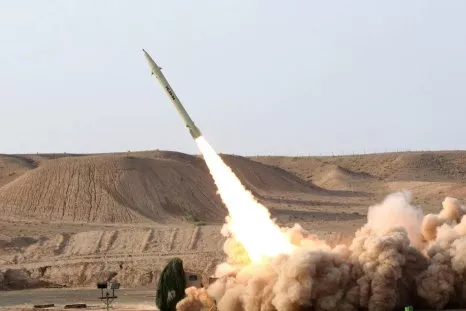American Troops Attacked Multiple Times in Just a Few Hours
U.S. troops based in Syria have been attacked several times within hours, an Iranian-backed group has said, as fears grow that hotspots of violence in the Middle East, including the Israeli-Palestinian conflict, could flare into broader bloodshed.
The Iranian-backed Islamic Resistance in Iraq group targeted the Al-Tanf military base, hosting U.S. troops in southern Syria, with two drones on Wednesday, representatives for the movement said in a statement.
The drones struck their intended targets, the group claimed. The Al-Tanf base has housed U.S. troops since 2016, close to the Syrian border with Iraq and Jordan.
The previous day, Islamic Resistance in Iraq said it had attacked the Ain al-Asad airbase, 135 miles northwest of Baghdad, where U.S. troops are stationed, with the two drones striking the facility.
An unidentified security source and a separate, anonymous government source confirmed the incident to Reuters on Tuesday. Islamic Resistance in Iraq said on Monday that it had launched attacks on U.S. troops in northern Syria and western Iraq.
The U.S. Central Command told Newsweek on November 6 that specific details of attacks by Iranian-backed proxies at Al-Tanf had not been released, but there had been a total of 28 attacks on U.S. assets since October 17.
U.S. troops in Syria and Iraq have come under increasing attacks since the outbreak of violence between Hamas and Israel, following the Palestinian group's coordinated attacks on October 7. These bases, and the U.S. military presence there, are intended to fend off a resurgence of ISIS and to combat Iranian influence in the countries.
The U.S. has worked to stop the spread of violence outside of Israel and the Gaza Strip, relocating no small number of assets to the region in the hopes of heading off wider conflict and discouraging any other actors from getting involved.
U.S. Secretary of State, Antony Blinken, said on October 22 that Washington was "concerned" about any possible escalation of conflict in the region by Tehran. "We expect that there's a likelihood of escalation—escalation by Iranian proxies directed against our forces, directed against our personnel," he said.
Iran has backed Islamic Resistance in Iraq, as well as Hamas and the Lebanon-based Hezbollah.
Between October 26 and October 31, the U.S. recorded a total of 27 "small-scale" attacks on bases housing U.S. personnel in Iraq and Syria, Pentagon press secretary, Brigadier General Pat Ryder said during a media briefing on Tuesday.
Of these, 16 were reported in Iraq and 11 in Syria. A senior defense official said that attacks on U.S. bases in Iraq and Syria were carried out with "a mix of one-way attack drones and rockets."
The U.S. is also deploying another 300 U.S. troops from American soil to the region, with the Defense Department adding on Tuesday they would not head for Israel, but would instead support American forces and deter further escalation.
Ryder would not specify the exact deployment locations, but told reporters that they "are intended to support regional deterrence efforts and further bolster U.S. force protection capabilities."
On October 26, U.S. Defense Secretary Lloyd Austin said the U.S. had carried out "self-defense strikes" on two facilities in east Syria that are used by Iran's Islamic Revolutionary Guard Corps and associated groups.
"These precision self-defense strikes are a response to a series of ongoing and mostly unsuccessful attacks against U.S. personnel in Iraq and Syria by Iranian-backed militia groups that began on October 17," he said in a statement. The strikes were "focused, precision-proportionate attacks," a senior defense official added on Monday.
The strikes, carried out by two F-16 fighter jets, were "separate and distinct from the ongoing conflict between Israel and Hamas," Austin said.
Update 11/20/2023 at 7:30 a.m. ET: This article was updated with a response from CENTCOM.
Disclaimer: The copyright of this article belongs to the original author. Reposting this article is solely for the purpose of information dissemination and does not constitute any investment advice. If there is any infringement, please contact us immediately. We will make corrections or deletions as necessary. Thank you.




